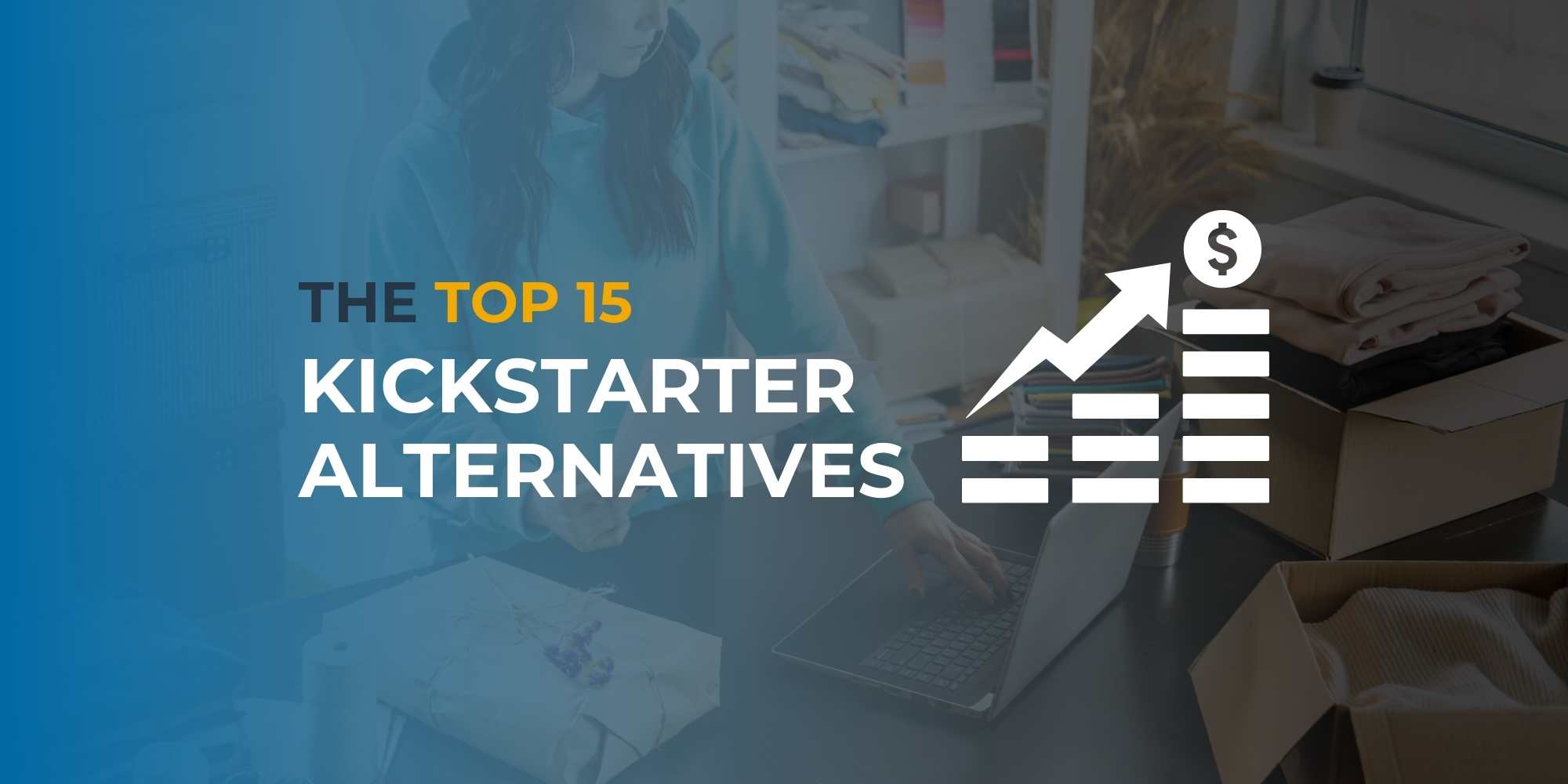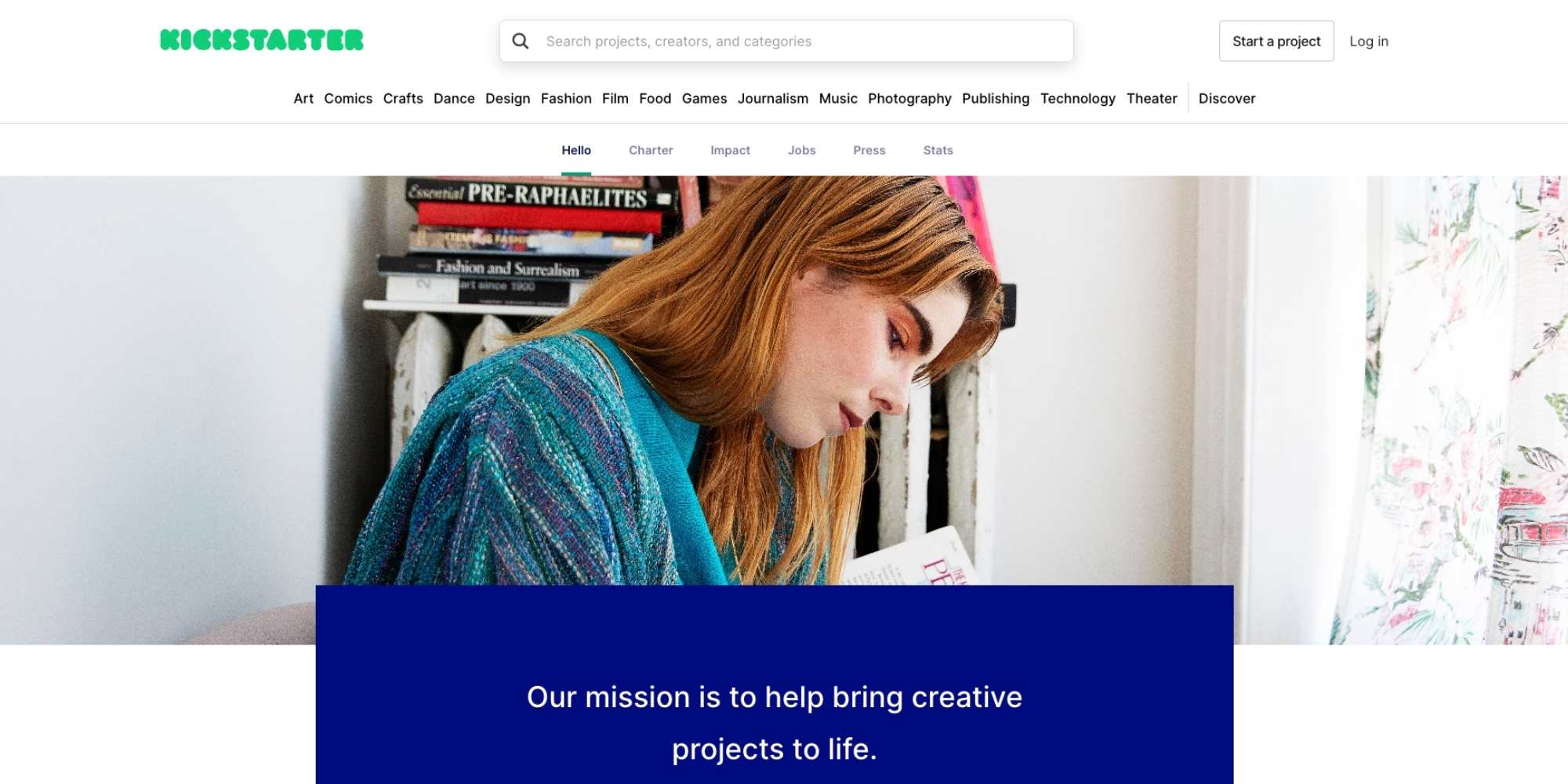
If you are looking to fund your next big project but want to explore alternatives to Kickstarter, there are numerous crowdfunding platforms to choose from. Each of the crowdfunding platforms have unique features that can benefit your business type and what you plan to accomplish.
Jump right in: The Top 15 Kickstarter Alternatives
What is Kickstarter?

Kickstarter started in 2009 and continues to be a place for creators to present their projects and seek funding from a global audience. Kickstarter projects can span across various categories, including art, technology, music, film, games, and more.
Finding the Right Crowdfunding Platform
With so many options, finding the right alternative crowdfunding platform for your business can be difficult. Don’t worry, below is a comprehensive list of the best alternatives to Kickstarter, with in-depth information on each of the crowdfunding platforms to ensure you make an informed decision.
Each of the platforms listed has its unique strengths and potential drawbacks, so it’s essential to consider what features are most important for your project. From Indiegogo’s flexible funding to Patreon’s subscription model, understanding these differences will help you make an informed decision.
15 Kickstarter Alternatives
#1 Indiegogo

Indiegogo is a platform that supports a wide range of projects, from tech innovations to creative ventures. Unlike Kickstarter, Indiegogo offers flexible funding options, allowing individuals to keep whatever money raised, even if the goal was not met.
Best for:
Innovators, creatives, and entrepreneurs looking for flexible funding options.
Pros:
- Flexible funding option
- Global reach
- Supports a wide variety of projects
Cons:
- Higher fees compared to other platforms

Indiegogo is a standout among crowdfunding platforms due to its flexible funding model.
Unlike Kickstarter’s all-or-nothing approach, Indiegogo allows campaigners to keep the funds they raise even if they don’t meet their goal.
#2 GoFundMe

GoFundMe is well-known for fundraising personal campaigns but is an exceptional option for small businesses and creative projects. GoFundMe allows those using their platform to keep all donations regardless of reaching your personal goals, representing an all-or-nothing funding model.
Best For:
Personal causes, small businesses, and community projects.
Pros:
- No deadline to meet fundraising goals
- Great for personal causes and small businesses
- Easy to Use
Cons:
- Higher fees on personal donations
- Not ideal for large-scale projects
Want to fulfill your crowdfunder products with ease?
Get a FREE quote from eFulfillment Service to see how we could help simplify your crowdfunding fulfillment.
#3 Patreon

Patreon allows creators to receive ongoing funding from their supporters. It’s ideal for writers, artists, and other creators who produce content regularly. Patrons subscribe to a creator’s work for a monthly fee, providing a steady income stream.
Best For:
Content creators needing consistent, ongoing funding.
Pros:
- Consistent, ongoing funding
- Strong community engagement
- Great for content creators
Cons:
- Requires constant content creation
- Not suitable for one-time projects

Patreon enables artists, musicians, and other creatives to earn a regular income through monthly contributions from their fans.
Since its launch, Patreon has helped over 200,000 creators raise more than $2 billion, providing tools for analytics, merchandising, and fan engagement.
#4 Crowdfunder

Crowdfunder is focused on equity crowdfunding, making it a perfect choice for startups and businesses looking to attract investors. Through this platform, co
Companies can offer equity in their business in exchange for investment.
Best For:
Startups and businesses looking for equity investment.
Pros:
- Ideal for business startups
- Attracts serious investors
- Potential for significant funding
Cons:
- Requires more complex setup
- Suitable mainly for established businesses
Trusted by eCommerce Brands Around the World.
Get some expert help by requesting a FREE quote from eFulfillment Service to see how we could help simplify your fulfillment.
#5 Seedrs

Seedrs is another equity crowdfunding platform that enables businesses to raise capital from a pool of investors. This UK-based platform is particularly popular in Europe and offers extensive support for businesses throughout the fundraising process.
Best For:
European startups and businesses seeking equity funding.
Pros:
- Strong investor network
- Comprehensive support for businesses
- Popular in Europe
Cons:
- Primarily geared towards european markets
- Equity crowdfunding regulations to navigate
#6 Fundable

Fundable offers both reward-based and equity-based crowdfunding options, making it a versatile choice for startups and businesses. The platform charges a monthly fee rather than taking a percentage of the funds raised.
Best For:
Startups and businesses looking for flexible funding options.
Pros:
- Offers both reward and equity funding options
- Flat monthly fee
- Good for businesses
Cons:
- Monthly fee may be a barrier for some
- Primarily US-focused

Wefunder caters to startups and businesses by offering equity crowdfunding, where backers receive company shares in return for their investment.
Wefunder’s fixed 7.5% fee is only charged if the campaign reaches its goal, ensuring a risk-free option for both creators and supporters.
#7 StartEngine

StartEngine is an equity crowdfunding platform that allows everyday people to invest in startups and early-stage companies. The platform has a low minimum investment requirement, democratizing the investment process.
Best For:
Startups seeking small to medium investments from a wide range of investors.
Pros:
- Low minimum investment
- Wide range of industries
- Strong investor engagement
Cons:
- Requires regulatory compliance
- Competitive market for startups
Create great products, Let Us Handle the Logistics!
Get a FREE quote from eFulfillment Service to see how we could help simplify your order fulfillment.
#8 WeFunder

WeFounder is a platform designed to help startups raise funds from their community and customers. It supports both equity and debt crowdfunding, making it a flexible option for various types of businesses.
Best For:
Startups seeking flexible funding options through community support.
Pros:
- Supports both equity and debt funding
- Engages community and customers
- Transparent process
Cons:
- Complex setup process
- Regulatory requirements
#9 Republic

Republic focuses on equity crowdfunding and is open to non-accredited investors, allowing anyone to invest in startups. The platform offers a wide range of industries to invest in and provides through vetting of projects.
Best For:
Startups looking for a diverse range of investors, including non-accredited investors.
Pros:
- Open to non-accredited investors
- Wide range of investment opportunities
- Thorough project vetting
Cons:
- Higher risk for investors
- Competitive platform for startups
#10 RocketHub

RocketHub is a global crowdfunding platform that offers a variety of tools and resources to help project creators succeed. It is well-suited for creative projects and scientific research, providing extensive support and visibility.
Best For:
Creative projects and scientific research needing global reach and support.
Pros:
- Global reach
- Extensive support and resources
- Ideal for creative and scientific projects
Cons:
- Lower traffic compared to larger platforms
- Higher competition for visibility
#11 Ulule

Ulule is a European crowdfunding platform that focuses on creative and innovative projects. It offers personalized support and a strong community of backers, making it an excellent choice for artists and entrepreneurs.
Best For:
Creative and innovative projects, particularly in Europe.
Pros:
- Personalized support
- Strong community engagement
- Focus on creative projects
Cons:
- Primarily European audience
- Limited reach compared to larger platforms
#12 Fundly

Fundly is a user-friendly crowdfunding platform ideal for personal, charity, and non-profit fundraising campaigns. It allows campaigners to create custom pages and leverage social media to reach a wider audience.
Best For:
Personal, charity, and non-profit fundraising.
Pros:
- Easy to use and set up
- Strong social media integration
- Suitable for personal and charitable causes
Cons:
- Higher transaction fees
- Limited to certain types of projects
See How a 3PL Can Help Your Crowdfunding Project Skyrocket!
Get a FREE quote from eFulfillment Service to see how we could help simplify your order fulfillment.
#13 MightyCause

MightyCause, focuses on fundraising for nonprofits, personal causes, and community driven projects. The platform offers robust tools for campaign management and donor engagement, making it a great choice for charitable organizations.
Best For:
Nonprofits and community-driven projects.
Pros:
- Comprehensive tools for nonprofits
- Strong donor engagement features
- Supports both personal and community projects
Cons:
- Limited to specific types of fundraising
- Higher fees for advanced features
#14 CrowdSupply

CrowdSupply specializes in hardware and product development projects. It provides extensive support for creators, including logistics and fulfillment services, ensuring backers receive their products efficiently.
Best For:
Hardware and product development projects.
Pros:
- Ideal for hardware and product development
- Logistics and fulfillment support
- Strong community of backers
Cons:
- Niche focus may not suit all projects
- More rigorous project vetting
Trusted by eCommerce Brands Around the World.
Get some expert help by requesting a FREE quote from eFulfillment Service to see how we could help simplify your fulfillment.
#15 Experiment

Experiment is a crowdfunding platform specially for scientific research projects. It supports researchers by providing a platform to raise funds for their experiments and studies, making it a unique alternative for those in the scientific community.
Best For:
Scientific research projects.
Pros:
- Dedicated to scientific research
- Peer-reviewed funding process
- Strong support for researchers
Cons:
- Limited to scientific projects
- Requires detailed project proposals
Summary
Choosing the right crowdfunding platform is crucial for the success of your project. While Kickstarter remains a popular choice, exploring these alternatives can open up new opportunities and benefits that better align with your project’s needs.
Whether you are seeking flexible funding options, ongoing support for content creation, equity crowdfunding, or a platform tailored to scientific research, there is a platform that fits your specific requirements.
Remember, the right platform can make all the difference in achieving your funding goals and turning your vision into reality. Take the time to research and choose the platform that best supports your project’s objectives and your overall mission.
With the right approach and platform, your crowdfunding campaign can reach new heights of success.
About the Author
Dugan Bradfield is a Michigan State University student writer whose aim is to make complex concepts easy to understand. His goal is to provide quality content that assists ecommerce seller’s growth.





Hello Dugan,
This is so helpful as I consider how to launch a variety of business ventures I’ve been considering. I must admit I was shocked to learn that the author was not INC magazine or something. Thanks again and good luck!
I love how you’ve covered so many Kickstarter alternatives—it really helps businesses figure out which platform fits their needs. There are so many options out there, so finding the best fit can definitely make all the difference. Thanks for sharing this info!